 Petzlover
Petzlover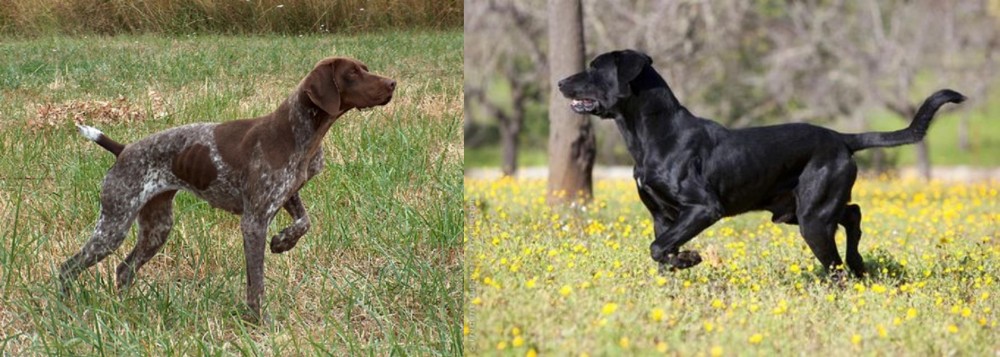 Braque Francais is originated from France but Perro de Pastor Mallorquin is originated from Spain. Both Braque Francais and Perro de Pastor Mallorquin are having almost same height. Braque Francais may weigh 15 kg / 34 pounds more than Perro de Pastor Mallorquin. Both Braque Francais and Perro de Pastor Mallorquin has almost same life span. Braque Francais may have more litter size than Perro de Pastor Mallorquin. Braque Francais requires Low Maintenance. But Perro de Pastor Mallorquin requires Moderate Maintenance
Braque Francais is originated from France but Perro de Pastor Mallorquin is originated from Spain. Both Braque Francais and Perro de Pastor Mallorquin are having almost same height. Braque Francais may weigh 15 kg / 34 pounds more than Perro de Pastor Mallorquin. Both Braque Francais and Perro de Pastor Mallorquin has almost same life span. Braque Francais may have more litter size than Perro de Pastor Mallorquin. Braque Francais requires Low Maintenance. But Perro de Pastor Mallorquin requires Moderate Maintenance
 Braque Francais was at first one general breed of hounds in the Gascognes and Pyrenees Mountains areas of France. The one breed became two. Known as the Braque Francais Gascognes and the Braque Francais Pyrenees - two separate breeds of very alike dogs. The Gascognes is a lot less common than his smaller brother. Not very much is known about the beginnings of these two strains of Braque Francais as the breed has been around since at least the 15th century. Because the Braque Francais was exported or taken to so many different countries in the 15th-18th centuries, a lot of the origins of the breeds were lost. A major bloodline search was The conducted in the 19th century and found that these were two very distinct breeds of dog.
Braque Francais was at first one general breed of hounds in the Gascognes and Pyrenees Mountains areas of France. The one breed became two. Known as the Braque Francais Gascognes and the Braque Francais Pyrenees - two separate breeds of very alike dogs. The Gascognes is a lot less common than his smaller brother. Not very much is known about the beginnings of these two strains of Braque Francais as the breed has been around since at least the 15th century. Because the Braque Francais was exported or taken to so many different countries in the 15th-18th centuries, a lot of the origins of the breeds were lost. A major bloodline search was The conducted in the 19th century and found that these were two very distinct breeds of dog.
It is known that France was the birthplace of this breed and it was developed because of a need for a tracker that could point, flush and retrieve. The Braque Francais Gascogne probably came from the south of France. It is related to the German Shorthair Pointer and the English Pointer as well. Having existed since the 15th century, he was the father of all pointing dogs in France. By the 17th century the breed had grown enough to be called the “old style Braque Francais”,
Though the origin of the breed is not known there are of course several theories about it. The most prevalent belief is that the Braque Francais Gascogne is a descendent of the Chien d’Oysel, a spaniel breed of medium size and white or brown with brown markings. The Chien d’Oysel is an ancient breed used for hunting prior to the 13th century. Hunters crossed the Chien with local dogs on a routine basis.
Braque Francais came out of these breedings. It was probably French Scent hounds that created the larger size of the Gascogne. This also increased the stamina and strength of the Gascogne as opposed to the Pyrenees. There was also a mixing in of the Grand Bleu De Gasgogne and the Petit Bleu De Gasgogne.
The other prominent theory is that this breed the Gasgogne was actually developed from the Portugese, Spanish and Italian pointers rather than the French dogs. These dogs originated not with the Chien d’Oysel but with the scent hounds. From these dogs came the Spanish and English Pointers. All that is truly known is that all of these types of dogs were present in Europe by the fifteenth century and were moved among countries and cross bred regularly. However in the part of France called the Central Pyrenees region and in a small southern part of France the original, old style Braque Francais was pure bred. This aspect of the breed contributed to the development of all of the French pointers and European shorthaired dogs. By the end of the 1800’s today’s breed was developed.
In 1850 the first Braque Francais breed club was established and in the breed standards for both dogs followed in 1880. They were then registered in the French Kennel Club and the International Kennel Club (FCI). The French Kennel Club does not allow dogs with any common ancestors in Generations 1-3 into the Club in order to keep out the practice of inbreeding. In Canada only the Gascogne is recognized and the United States’ United Kennel Club (UKC) recognizes both. The American Kennel Club (AKC) does not recognize either.
With most local regions and countries choosing their local dogs over other breeds, the Braque Francais Gascogne has become fairly rare outside of France where the breed was the most popular gun dog throughout the 1700’s. The Gascogne was mostly a dog of the hunting nobility because of its size and food needs. Following the French Revolution, the breed fell off dramatically, while the smaller Pyrenees continued to thrive. This was because in the Pyrenees Mountains and the Southwestern region of Gascony, the English Pointer never supplanted the Braque Francais.
The Second World War was brutal to the Braque Francais Gascognes and as it recovered it became much less common than its sister breed. Today it is found almost exclusively in France.
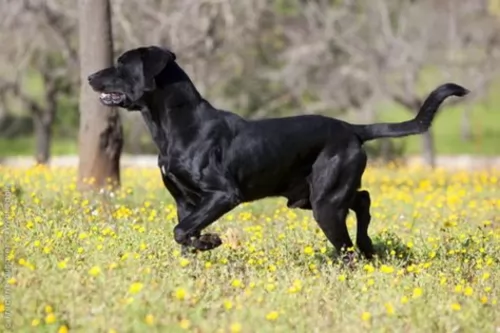 Known also as the Majorca Shepherd Dog or Ca de Bestiar, the very name Perro de Pastor Mallorquin means Shepherd dog of Mallorca.
Known also as the Majorca Shepherd Dog or Ca de Bestiar, the very name Perro de Pastor Mallorquin means Shepherd dog of Mallorca.
The dog hails from Spain and has been used as a general purpose farm dog. The diligent work of fans of the dog to encourage its development were rewarded when the dog - both short- and long haired varieties - gained recognition from the Fédération Cynologique Internationale.
The dog is really only popular in its homeland where it is appreciated for its guarding and herding abilities.
 The Braque Francais Gascogne is a larger dog than the Pyrenees breed and is a very handsome dog. Both have a deep chest, a solid bodies, strong and slender legs and are well-proportioned. They have padded, round paws and a large brown head with floppy ears. The muzzle is a pointed block and he has a scissors bite, with a black nose and dark or amber eyes. The eyes are very expressive and round. The tail can be straight and long, or it can be docked. They are tall and athletic.
The Braque Francais Gascogne is a larger dog than the Pyrenees breed and is a very handsome dog. Both have a deep chest, a solid bodies, strong and slender legs and are well-proportioned. They have padded, round paws and a large brown head with floppy ears. The muzzle is a pointed block and he has a scissors bite, with a black nose and dark or amber eyes. The eyes are very expressive and round. The tail can be straight and long, or it can be docked. They are tall and athletic.
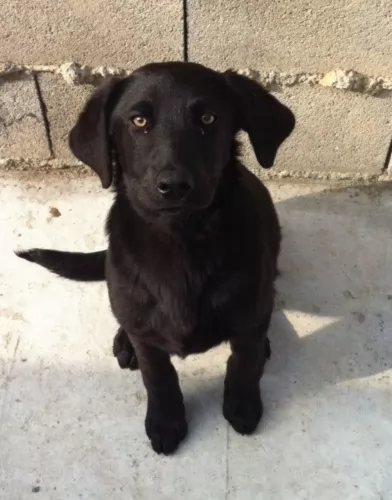 The Perro de Pastor Mallorquin is a large dog which stands between 62 and 73 cm and weighs between 35 and 40kg. Most of them are short haired, ensuring low grooming requirements for the owner. The coat is black, in fact the Fédération Cynologique Internationale says its the only color which is acceptable. He has floppy ears and the tail is long, rising when the dog is on the move.
The Perro de Pastor Mallorquin is a large dog which stands between 62 and 73 cm and weighs between 35 and 40kg. Most of them are short haired, ensuring low grooming requirements for the owner. The coat is black, in fact the Fédération Cynologique Internationale says its the only color which is acceptable. He has floppy ears and the tail is long, rising when the dog is on the move.
The Perro de Pastor Mellorquin is a dominant, independent and wilful dog that will need to be trained and socialized if he is to be obedient. He is fiercely devoted to his owner, being loving and protective. This training is actually important as the Majorca Shepherd Dog doesn't take easily to strangers and can in fact show signs of aggression when around them.
It is qualities like this that make him a good guardian and watchdog. With training and socialization he will be able to get on well with other pets in the home as well as with children who have been taught how to respect- and be kind to animals.
He is an active dog too and it is better to have such a dog in the suburbs or the countryside as opposed to living in a small city property.
 This is a working breed, but they are nevertheless friendly and loyal to their families. They want to please their people and are usually docile. They love kids and are good as a first ever dog. They are friendly and even-tempered. They tolerate people they do not know but can be shy and are not guard dogs. instead they are loving, affectionate and people oriented. They need to be with their families and never left outside alone. They can develop separation anxiety.
This is a working breed, but they are nevertheless friendly and loyal to their families. They want to please their people and are usually docile. They love kids and are good as a first ever dog. They are friendly and even-tempered. They tolerate people they do not know but can be shy and are not guard dogs. instead they are loving, affectionate and people oriented. They need to be with their families and never left outside alone. They can develop separation anxiety.
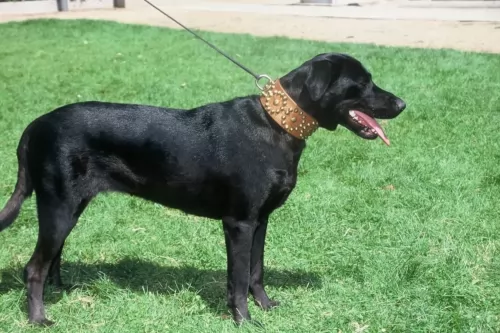 The Perro de Pastor Mallorquin is a dog known for its devotion to its owner, taking on his role as guardian and protector very seriously.
The Perro de Pastor Mallorquin is a dog known for its devotion to its owner, taking on his role as guardian and protector very seriously.
It is a courageous dog, strong willed and confident and isn't recommended as a first choice of dog for the novice dog owner, although there have been first-time dog owners who bring their dogs up correctly and have tremendous success with them.
Provide your dog with a firm consistent, kind, patient and loving home, and you can also be one of those first-time dog owners who highly recommend this dog as an awesome pet for any household.
 The Braque Francais is a fairly healthy breed. They are susceptible to certain health conditions that most dogs of their size and working history are susceptible to. These include Patellar luxation which seems to be one of the most common problems for them. They also can have hip and/or elbow dysplasia, aortic stenosis which is a narrowing of the aorta, and some eye issues such as ectropion, entropion, and PRA (Progressive Retinal Atrophy as well as cataracts.
The Braque Francais is a fairly healthy breed. They are susceptible to certain health conditions that most dogs of their size and working history are susceptible to. These include Patellar luxation which seems to be one of the most common problems for them. They also can have hip and/or elbow dysplasia, aortic stenosis which is a narrowing of the aorta, and some eye issues such as ectropion, entropion, and PRA (Progressive Retinal Atrophy as well as cataracts.
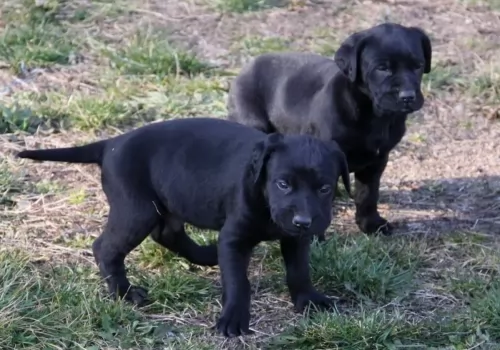 A dog can live a long, happy life when he has been looked after well. Makig sure he doesn't become obese, giving him enough exercise and loving him can ensure longevity. Your Perro de Pastor Mallorquin can live to be 13, 14 or 15 years of age, but there are always some common dog illnesses to be aware of -
A dog can live a long, happy life when he has been looked after well. Makig sure he doesn't become obese, giving him enough exercise and loving him can ensure longevity. Your Perro de Pastor Mallorquin can live to be 13, 14 or 15 years of age, but there are always some common dog illnesses to be aware of -
This is a disease of the hip where the ball and socket joint isn’t formed properly. The result is a joint that rubs as opposed to sliding smoothly. This is one of the most common skeletal diseases in dogs seen more often in large dogs. The disease can start while the dog is still young and it can lead to osteoarthritis an decreased activity.
One of the eye diseases is when the uvea of the eye becomes inflamed, creating a painful condition known as anterior uveitis or inflammation of the front of the eye.
This disease can threaten your dog’s vision. It is painful with redness of the eye, there could be a discharge too as well as excessive watery eyes. Cancer, infections and injury can all be to blame and your vet will want to examine your dog.
 This is a high energy, working dog with a need for a high-quality energy food or raw food that you make up yourself. Be sure to include chicken, beef and fish. Feed him about 3 cups once a day or 1.5 cups twice a day.
This is a high energy, working dog with a need for a high-quality energy food or raw food that you make up yourself. Be sure to include chicken, beef and fish. Feed him about 3 cups once a day or 1.5 cups twice a day.
In addition to the conditions listed above, his long floppy ears can lead to ear infections if not cared for. Wash them out daily. He is also susceptible to bloat so don’t feed him large meals and don’t let him exercise or work right before or right after exercise.
These dogs have a variety of hunting skills. They are not only pointers but can flush, trail and retrieve. The Gascogne is not as quick as the Pyrenees. They need a lot of exercise daily or they need a hunting job. They would do well with barn hunt, lure coursing and free play in an off leash fenced in area. If they don’t get rid of their energy, they can be destructive. They were bred to hunt and cannot resist the chase,
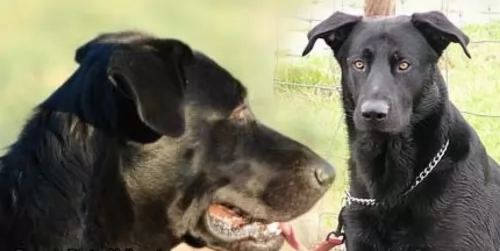 The Majorca Shepherd Dog isn't a heavy shedder but still, he will require some basic grooming such as brushing the coat twice a week to remove loose hairs and to retain his natural shine.
The Majorca Shepherd Dog isn't a heavy shedder but still, he will require some basic grooming such as brushing the coat twice a week to remove loose hairs and to retain his natural shine.
Other care and grooming routines for your pet are to check inside his mouth for dental disease as problem teeth can cause a host of diseases in the body.
Check inside his ears too and make sure they aren't red and itchy as this could be indicative of an ear infection.
Nail clipping is also important as his nails can hook onto things and rip open the flesh around the paw area.
These dogs are lively and energetic, having been used to do lots of work herding and guarding sheep. He isn't a dog to be left in the backyard day after day without human inter-action and exercise. He will require some hectic exercise every day and will love to join you with your jogging or cycling, running beside you. Take him with you on our walks and hikes.
Only the best dog food is recommended for this dog of yours. If you intend feeding your pet commercially manufactured food, make sure its the best quality ones – those with protein listed at the top of the ingredient list and with a good amount of vitamins and minerals.
Choose the food according to your dog's size, his age and his energy levels. If you're going to give your pet home-made food, keep it simple to avoid upset stomachs and vet's bills.
Boiled chicken, brown rice or pasta and cooked vegetables such as spinach, sweet potato and carrots are wonderful for a dog when added into the kibble occasionally as a tasty treat. You can also try to include some raw meat into the kibble from time to time.
Dog's just want simple, wholesome foods like this, no unpleasant surprises of spicy, 'people foods'. Never leave your pet without a supply of fresh, cool water.
Take your puppy to the vet to have his vaccines, as the canine parvo-virus (CPV) infection for instance, isn't only a very contagious viral illness that affects dogs, it can be a killer. Keep a check on your adult dog too and see that he gets to the vet at any sign of illness.